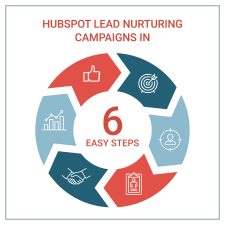Here’s the million dollar question: How do we convert leads into customers? Sometimes you just have to show your prospects a little love. In our last blog post, we talked about setting up automated workflows in HubSpot. As we learned, you can set up a workflow to achieve any number of marketing/sales goals. One of the most tried true workflows you can automate is a lead nurturing campaign.
What is a HubSpot Nurture Campaign?

Wouldn’t it be great if every potential customer visited your website for the first time and went right to buying your product or service, no questions asked? Yeah, that would make life a lot simpler for most of us, but it probably means my marketing agency wouldn’t be all that necessary. The truth is (thankfully for me) it usually takes a little more effort to convert your audience into happy customers.
That’s where a lead nurturing campaign shines. The idea is to send a series of helpful emails aimed at empowering your leads to make the best decision for their needs through valuable information and answering any questions they might have. Through a powerful CRM like HubSpot, you can set up beautiful email campaigns that help you achieve a smooth hand-off to your sales department. Your salespeople can rest easy knowing the leads they’ll be talking to are informed and ready to buy. So, let's dive into 6 steps that will help you empower your marketing and sales team to turn more leads into customers.
1. Setting Goals for Your Lead Nurturing Campaign
 The first step in setting up a successful lead nurturing campaign is determining its overall goal. A key thing to remember is that your lead nurturing campaign should be content-driven, informative and helpful. In other words, the emails you send should aim to answer common questions and shed more light on your solutions.
The first step in setting up a successful lead nurturing campaign is determining its overall goal. A key thing to remember is that your lead nurturing campaign should be content-driven, informative and helpful. In other words, the emails you send should aim to answer common questions and shed more light on your solutions.
Linking to relevant blog posts you’ve written or providing FAQ videos are great examples of this. Don’t fall into the trap of sending out pricing sheets or special deals too early in the process. Doing so forces a yes or no from your audience—a decision they’ll be making without all the necessary info you could help provide.
Instead of trying to obtain a credit card number out of the gate, focus your campaigns on softer goals that will encourage your audience to move forward with your organization—something that will have the wanting more content. The campaign’s goal could be awakening dormant leads, better qualifying existing leads, or simply attracting new leads into your pipeline. Again, don’t make it about a sales quota.
Once you’ve settled on the goals of the overarching campaign, you can begin to determine what you want the goal of each individual email. Again, these individual goals should be related to your overarching goals, but specific enough that you’re not doubling your efforts in multiple emails. For example, the first email you send might include links to some of your blog content with the goals of simply sharing valuable information. Your second email might expand on this idea with a premium content offer, the goal being your recipients download it. Your final email might aim to prime your leads for the hand-off to sales, with the goal being to speak to a salesperson.
Whatever the individual goals are, make sure they are specific, measurable, achievable, realistic and timely, or SMART.
2. Select a Buyer Persona
 What does your ideal customer look like? How do they behave and what questions are they most likely to have about your product or service? Define the person to whom you’re trying to sell and try to identify their specific business problem. Are they looking for a cheaper product? Do they want a business that offers more personal attention?
What does your ideal customer look like? How do they behave and what questions are they most likely to have about your product or service? Define the person to whom you’re trying to sell and try to identify their specific business problem. Are they looking for a cheaper product? Do they want a business that offers more personal attention?
If you’ve never thought about creating a buyer persona, it’s a great place to start before diving into a lead nurturing campaign, or any marketing activities for that matter. Buyer personas are fictional representations of your ideal customers and help you steer all of your marketing efforts from lead nurturing campaigns to the look and feel of your organization’s website.
Once you’ve established a buyer persona, craft your messaging to suit their needs. Write every single line of copy with them in mind. What kind of email subject line do you think they’d be most likely to open?
3. Map Content to Sales Stages
 One of the most important parts about the marketing process is meeting your prospects where they are. In others, make sure you’re keeping the Buyer’s Journey in mind. In other words, your lead nurturing campaign needs to meet a potential customer where they are. The Buyer’s Journey is made up of three stage:
One of the most important parts about the marketing process is meeting your prospects where they are. In others, make sure you’re keeping the Buyer’s Journey in mind. In other words, your lead nurturing campaign needs to meet a potential customer where they are. The Buyer’s Journey is made up of three stage:
Awareness: They realize they have a problem, but don’t know what the solution is
Consideration: They are looking for options to help solve the problem
Decision: They are ready to choose a solution
It’s important to identify where your prospects fall along this timeline. For example, if someone has just entered their email to download your informational ebook, they’re probably somewhere closer to the Consideration stage. They’re probably not ready to see your pricing sheet. Instead, try sending out more helpful information such as links to relevant blog articles or other resources. If you see good engagement, your workflow can then trigger more Decision Stage content—such as booking a demo or a link to talk to a sales rep.
Audit your organization’s current content and separate it by the stages of the Buyer’s Journey. This will help you map out a good order for delivering it through the nurture campaign. If you find you’re missing content in any of these stages, it’s a good idea to create it before setting up the campaign.
4. Prime the Sales Pump
 A good marketing strategy ends with a successful hand-off to your sales team. When your marketing and sales team play nicely together, everybody wins. The marketing team knows what the sales team is looking for and can deliver more sales qualified leads (SQLs), enabling your reps to talk to more informed customers who are closer to signing on the dotted line. We call this relationship “Smarketing.”
A good marketing strategy ends with a successful hand-off to your sales team. When your marketing and sales team play nicely together, everybody wins. The marketing team knows what the sales team is looking for and can deliver more sales qualified leads (SQLs), enabling your reps to talk to more informed customers who are closer to signing on the dotted line. We call this relationship “Smarketing.”
"Smarketing" means your marketing and sales teams are in constant communication, sharing their objectives and goals and how each side can support the other. One way this is enacted through a lead nurturing campaign is for the marketing team to ensure the sales team knows what information the leads are coming in with. Your sales team should know a prospect’s pain points and the questions they need to have answered before ever contacting them.
5. Measure and Improve Your Lead Nurturing Campaign
 As with any online strategy, diving into the analytics can shed some serious light on how well it’s working. Once you’ve completed a lead nurturing campaign, there are plenty of metrics you can look into that will help you build better campaigns in the future.
As with any online strategy, diving into the analytics can shed some serious light on how well it’s working. Once you’ve completed a lead nurturing campaign, there are plenty of metrics you can look into that will help you build better campaigns in the future.
HubSpot offers a great way to analyze every aspect of your campaigns and help you determine the best ways to optimize going forward. Some metrics you should always look at include:
- Open Rates
- Click-through Rates
- Unsubscribes (and after which email)
- Traffic on your website from emails
These stats will help you nail the content and messaging that’s working or not working for your audience. At the same time, don’t throw out the entire playbook and start from scratch just because something isn’t performing. Change one thing at a time—whether it’s the language in or placement of an underperforming CTA, a blog article no one’s reading, or a content offer that isn’t seeing the number of downloads you thought it would.
The beauty of online marketing is that nothing is ever set in stone. You can make improvement after improvement to help drive more leads and close more sales. Don’t get discouraged if your first nurture campaign doesn’t show immediate results.. Analyse what could be improved, but don’t forget to look at what’s working. You should always be tinkering.
6. Rinse & Repeat
 Just like you should be analyzing what isn’t performing in your nurture campaigns, it’s important to take away what is. What content really seemed to rack up the engagement? How else can you promote it? Use the success of your lead nurturing campaign to fuel other strategies across your digital marketing efforts. Chances are, if the contacts in your pipeline found your information helpful, people surfing the web will, too.
Just like you should be analyzing what isn’t performing in your nurture campaigns, it’s important to take away what is. What content really seemed to rack up the engagement? How else can you promote it? Use the success of your lead nurturing campaign to fuel other strategies across your digital marketing efforts. Chances are, if the contacts in your pipeline found your information helpful, people surfing the web will, too.
The best part about a workflow like a lead nurture campaign, is that you can fully automate them. When a new contact is added to the workflow, they’ll start receiving your communications at the same cadence as the first batch. All you have to do is hit “go.”
Learn More About HubSpot Lead Nurturing with ProFromGo
There’s a lot to unpack when it comes to lead nurturing, but we've has got you covered. If you're interested in nurturing more leads, or sales and marketing automation in general, contact ProFromGo to learn how we can help you get there.



